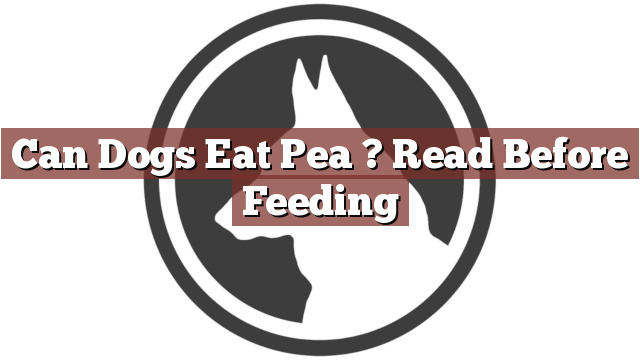Understanding Your Dog’s Dietary Needs
As a responsible dog owner, it is crucial to understand your furry friend’s dietary needs. While dogs are primarily carnivorous, they can also benefit from certain fruits and vegetables. However, it is important to note that not all human foods are safe for dogs. Their digestive systems and metabolism differ from ours, meaning some foods can be harmful or even toxic to them. Therefore, it is essential to educate yourself on what is safe and healthy for your canine companion.
Can Dogs Eat Peas? Read Before Feeding
Can dogs eat peas? The answer is yes. Peas can be a healthy addition to your dog’s diet, thanks to their high fiber and nutrient content. They are low in calories and fat, making them an excellent choice for dogs on a weight management plan. Additionally, peas contain essential vitamins such as vitamin A, vitamin C, and vitamin K, which contribute to a strong immune system and overall well-being.
However, it is important to prepare peas properly before serving them to your dog. Fresh or frozen peas are safe options, as long as they are cooked thoroughly to ensure easy digestion. Avoid using canned peas, as they often contain added sodium, which can be harmful to your pet. It is also advisable to consult with your veterinarian before introducing peas or any new food into your dog’s diet, especially if your dog has any specific dietary restrictions or health issues.
Pros and Cons of Feeding Peas to Your Dog
Feeding peas to your dog has several advantages. Firstly, the high fiber content in peas can promote healthy digestion and prevent constipation. Peas also contain antioxidants, which can help reduce inflammation and support your dog’s overall immune system. Additionally, the vitamins present in peas contribute to maintaining optimal health and vitality.
However, there are a few considerations to keep in mind. While peas are generally safe for dogs, some dogs may have difficulty digesting them, leading to gas or an upset stomach. If you notice any adverse reactions after introducing peas to your dog’s diet, it is best to discontinue feeding them this particular vegetable. It is essential to remember that peas should only be served as a supplement to a balanced and nutritious diet, rather than as a primary food source.
Conclusion: Considerations for Feeding Peas to Your Canine Companion
In conclusion, dogs can eat peas, but there are a few important factors to consider. Peas can be a nutritious and healthy addition to your dog’s diet, providing them with essential nutrients and fiber. However, it is crucial to cook them thoroughly and avoid canned peas that may contain added sodium. As with any dietary changes, it is recommended to consult with your veterinarian before introducing peas into your dog’s diet, especially if your dog has any specific dietary requirements or sensitivities. By understanding your dog’s dietary needs and making informed choices, you can ensure a happy and healthy life for your four-legged friend.
Thank you for taking the time to read through our exploration of [page_title]. As every dog lover knows, our furry friends have unique dietary needs and responses, often varying from one canine to another. This is why it's paramount to approach any changes in their diet with caution and knowledge.
Before introducing any new treats or making alterations to your dog's diet based on our insights, it's crucial to consult with a veterinarian about [page_title]. Their expertise ensures that the choices you make are well-suited to your particular pet's health and well-being.
Even seemingly harmless foods can sometimes lead to allergic reactions or digestive issues, which is why monitoring your dog after introducing any new food item is essential.
The content provided here on [page_title] is crafted with care, thorough research, and a genuine love for dogs. Nevertheless, it serves as a general guideline and should not be considered a substitute for professional veterinary advice.
Always prioritize the expert insights of your veterinarian, and remember that the health and happiness of your furry companion come first.
May your journey with your pet continue to be filled with joy, love, and safe culinary adventures. Happy reading, and even happier snacking for your canine friend!

